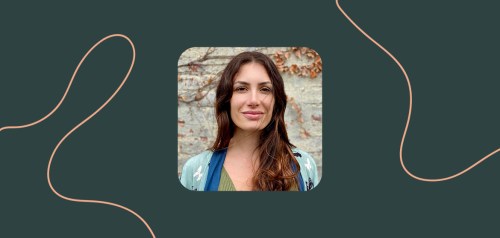It’s a New Year, and for many, that calendar distinction functions as a line in the sand that signals fresh-start energy. No matter whether you’re a resolutions person or have more of a “new year, same me” philosophy, it’s tough to ignore the energetic opportunity that early January presents for checking in with yourself. Being introspective about any number of facets of life and how you feel about each in the scope of what you ultimately dream for yourself can be positive. But sometimes, a laser focus on the future can function as a barrier to enjoying the present. Indeed, being too hopeful is possible, and it could lead to a lack of fulfillment.
Experts in This Article
somatic and relational psychotherapist, and co-founder of Spoke, a community-based organization for group support
In this week’s episode of The Well+Good Podcast, host Ella Dove speaks with Lia Avellino, LCSW, therapist and co-founder and CEO of therapy group Spoke, about the conundrum of needing to be and feel good “enough” can unintentially shield us from joy.
Listen to the full podcast episode here:
According to Avellino, many folks feel pressure that’s both internal and external to create a life that’s optimized, or, some might say, perfect. But, if you feel the need to secure a dream job, find a soul-mate partner, have a tight-knit circle of friends, and, in general, check all the boxes that one would assume add up to a quality life, you may well feel like you’re running at full tilt on a hamster wheel. Worse yet, even if all those boxes are checked, the hamster wheel doesn’t stop or even slow, because there’s always room for improvement when you desire to optimize your life. That’s why Avellino wants you to stop being too hopeful, embrace the concept of “good enough,” and find a sense of happiness with what you have.
“The goal of ‘good enough’ is to broaden the lens to not only looking at lack, but also looking at the fullness; where we might be hitting the mark already and [where] we might be missing it.” —Lia Avellino
“The goal of ‘good enough’ is to broaden the lens to not only looking at lack, but also looking at the fullness; where we might be hitting the mark already, and [where] we might be missing it,” Avellino says. This isn’t to say that being introspective and having intentions to mindfully work on parts of ourselves and our lives isn’t worthy, but constantly chasing self-improvement can be exhausting and diminishing. So, what’s the right balance?

According to Avellino, having hope for the future is an important tool that can be helpful for visualization and achieve goals. But it’s a double-edged sword in that having a fixation on tomorrow can obscure all that we can learn and appreciate today. “If we’re constantly staying in a realm of hopefulness, we are not necessarily connecting with what we already have,” Avellino says. “We’re trying to escape by living in the future and making things better rather than feeling that a full life means discontentment,” she says.
So, have hope, but don’t allow that hope to make you disengage from what’s happening in the present—even if you don’t love the way the present feels. “A full life does not mean happiness all the time,” Avellino says. “Happiness is a fleeting emotion, and aliveness is not happiness… [Aliveness] is feeling the spectrum, the fear, the sadness, the grief, the anger.” To harness hope the right way, take stock of the present as well.
For more of Avellino’s tips and thoughts for how to feel fulfilled and abandon a need for perfection, listen to the full episode.
Sign Up for Our Daily Newsletter
Get all the latest in wellness, trends, food, fitness, beauty, and more delivered right to your inbox.
Got it, you've been added to our email list.










